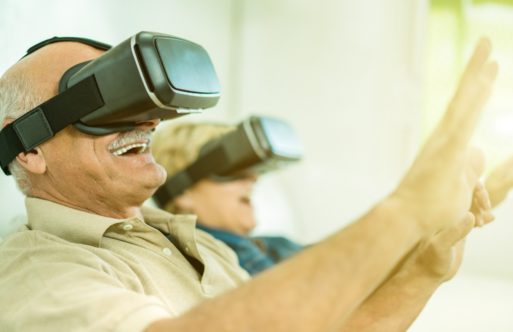
Credit: seniorlifestylemag.com
Grab those glasses and “Go, Granny, go!”
Virtual reality gear for the elderly is not a fashion statement, but in the coming years, it might be a common sight. Using virtual reality and reminiscence therapy is a new way to improve the mood, the memory, and the interaction of patients with dementia.
The Power of Remembering: Reminiscence Therapy
Reminiscence therapy is one of the most common approaches of dementia-patient caregivers. It consists of providing props, photographs, personal items, music and film of a particular era to trigger memories for dementia sufferers.
People with dementia have memories, but they are not easily accessible. Reminiscence therapy prods their memory by providing tangible clues to the past. Patients are then asked to talk about the experiences of their lives — recovering for a few moments the identity that is often shrouded in dementia.
Because reminiscence therapy has proven to be effective, some countries are building whole villages that replicate a specific locale or time period. One “Dementia Village” outside of Amsterdam allows people suffering from dementia to exist in a recognizable, non-sterile environment.
But what happens when you combine the proven treatment of reminiscence therapy with cutting-edge technology?
You get virtual reality reminiscence therapy, which lets seniors put on a pair of special goggles and be transported to a different place and time.
Imagine the memories that would spring unbidden into your mind if you were suddenly standing in front of your childhood home. What would you remember if you felt like you had fallen straight into your college campus or favorite vacation site?
Reminiscence Therapy Meets Virtual Reality Technology
Virtual reality reminiscence therapy immerses patients in familiar surroundings with the aid of cutting-edge technology. Patients become animated and happy when viewing pictures of places they have been. Sparks of recognition generate interaction with others that would not have occurred without the virtual reality reminiscence therapy.
Several companies are specializing in virtual reality therapy for seniors. One, a UK healthcare company called Virtue, was developed by Arfa Rehman and Scott Gorman. Touted as the world’s first platform for immersive reminiscence therapy, Look Back was created for a friend’s grandmother who kept trying to go back to the cabin where she had grown up in Norway. Rheman and Gorman decided to help by virtually immersing her in scenes of her homeland and the cabins of her childhood, curing her of the need to escape her care facility.
Freedom In Spite of Mobility Issues
Nor is virtual reality just for dementia sufferers. Senior citizens who lack mobility are stimulated by virtual tours of far-away places. The frail or ill can still be taken virtually to interesting places, out of their care facilities and back out into a wider world. An American program called Rendever focuses on improving the quality of life for the elderly by providing virtual tours of famous sights and landmarks, as well as familiar scenes of yesteryear.
In the future, virtual reality glasses and game-like gear on the elderly will be a common sight, enhancing lives and easing the pain of dementia.

 Fighting Dementia with Virtual Reality Reminiscence Therapy
Fighting Dementia with Virtual Reality Reminiscence Therapy





 Composting Bodies Is Now Legal in a Dozen States
Composting Bodies Is Now Legal in a Dozen States














